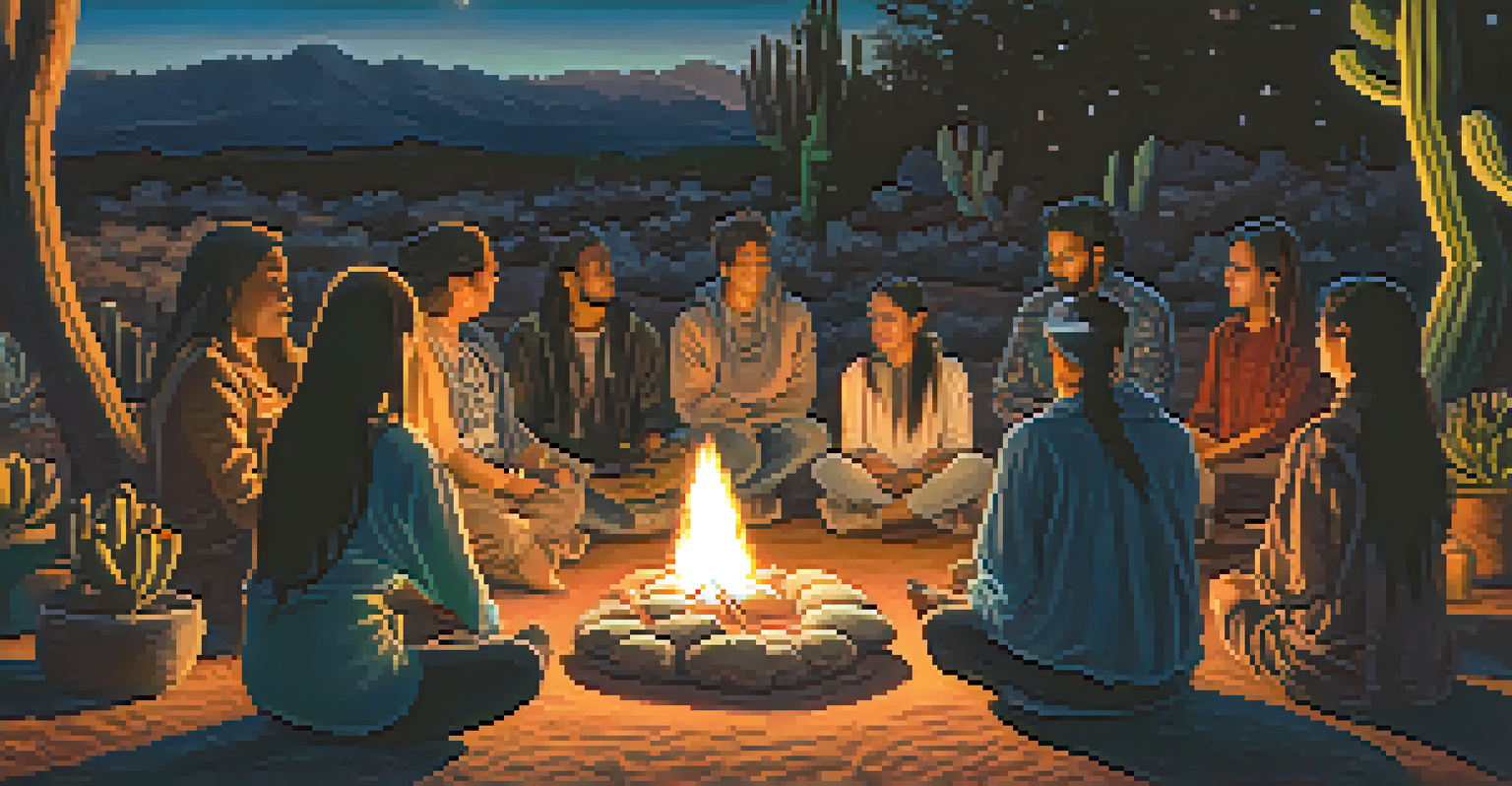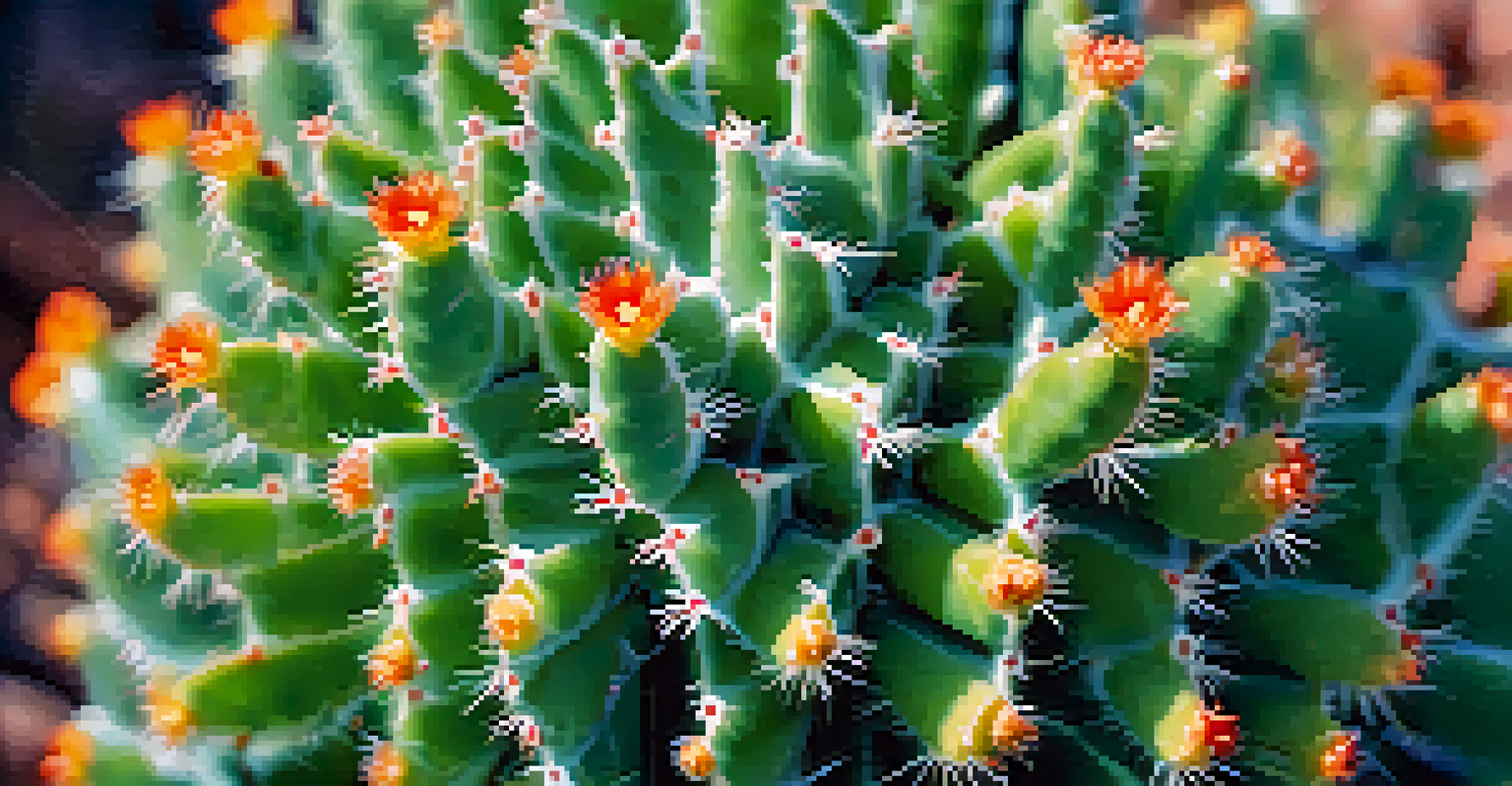Peyote, Spirituality, and the Quest for Ecological Harmony

Understanding Peyote: A Sacred Cactus
Peyote, a small cactus native to North America, has a rich history in spiritual practices, particularly among Indigenous peoples. Known scientifically as Lophophora williamsii, this unique plant contains mescaline, a psychoactive compound that has been used for centuries in religious ceremonies. For many, peyote is not just a plant; it symbolizes a gateway to deeper understanding and connection with the universe.
The Earth does not belong to us; we belong to the Earth.
The use of peyote in spiritual rituals often aims to foster a profound sense of introspection and community. Participants consume the cactus in a ceremonial setting, often guided by a shaman or spiritual leader, to explore their consciousness and gain insights into their lives. This collective experience strengthens social bonds and reinforces cultural traditions.
However, it's essential to approach peyote with respect and an understanding of its cultural significance. Its use should never be trivialized; instead, it invites participants to engage with the plant and its history thoughtfully. By doing so, we honor the traditions that have preserved this sacred practice for generations.
Spirituality and the Natural World
Spirituality often emphasizes a connection to nature, highlighting the interdependence of all living things. Many spiritual practices encourage individuals to seek harmony within themselves and with the environment. This quest for balance has become increasingly important in our rapidly changing world, where ecological concerns are at the forefront of global discussions.

In many Indigenous cultures, the belief that humans are caretakers of the Earth fosters a sense of responsibility towards nature. This perspective encourages practices that promote sustainability and respect for natural resources. By recognizing our place within the ecosystem, we can cultivate a more harmonious relationship with the world around us.
Peyote's Spiritual Significance
Peyote serves as a sacred tool for spiritual introspection and community bonding among Indigenous peoples.
Peyote plays a significant role in this spiritual connection, as its use often leads to profound revelations about the importance of ecological stewardship. Participants may come away with a renewed sense of purpose, feeling compelled to protect the environment and advocate for sustainable practices within their communities.
The Role of Peyote in Ecological Awareness
As people engage with peyote and its spiritual teachings, many find themselves more attuned to ecological issues. The introspective journeys often reveal insights about the impact of human actions on the environment. This newfound awareness can inspire individuals to take action, whether through personal lifestyle changes or community initiatives.
In every walk with nature, one receives far more than he seeks.
For instance, someone who has experienced a peyote ceremony might feel motivated to reduce their carbon footprint or advocate for conservation efforts. The emotional and spiritual insights gained can translate into tangible actions that contribute to ecological balance. This interconnectedness between spirituality and environmental stewardship is vital in fostering a healthier planet.
Additionally, peyote's traditional use in Indigenous communities emphasizes sustainable practices in harvesting and utilizing natural resources. By learning from these time-honored practices, we can develop a deeper understanding of how to live harmoniously with nature and contribute to its preservation.
Challenges Facing Peyote and Its Ecosystem
Despite its spiritual significance, the peyote cactus faces numerous challenges due to overharvesting and habitat loss. Increased demand for peyote, especially as interest in psychedelics grows, has put significant pressure on wild populations. This raises important ethical questions about the sustainability of peyote use and the responsibility of those who partake in its ceremonies.
Conservation efforts are crucial to ensuring that peyote can continue to thrive for future generations. Educating users about sustainable practices and the importance of protecting natural habitats can help mitigate the risks associated with peyote harvesting. By fostering awareness and promoting responsible use, we can work towards preserving this sacred plant.
Ecological Awareness Through Peyote
Engaging with peyote can heighten awareness of ecological issues and inspire actions for environmental stewardship.
Moreover, supporting Indigenous communities that have historically cared for peyote can provide a pathway for sustainable practices. Collaborating with these communities not only honors their traditions but also ensures a more sustainable future for peyote and its ecosystem.
Healing Through Peyote: A Personal Journey
Many who have participated in peyote ceremonies speak of profound healing experiences, both emotionally and spiritually. The plant's psychoactive properties often allow individuals to confront past traumas and gain clarity on personal issues. This journey of self-discovery can lead to transformative changes in one's life.
For example, a person struggling with grief may find solace and understanding through their peyote experience, offering them a new perspective on loss. These healing moments underscore the importance of not just individual growth but also the collective healing of communities that have been impacted by historical traumas.
Thus, peyote serves as a tool for personal and communal healing, promoting a sense of interconnectedness that extends beyond the individual. This journey of healing can inspire individuals to engage more deeply with ecological issues, as they recognize the importance of nurturing both their inner selves and the environment.
The Future of Peyote and Ecological Harmony
Looking ahead, the future of peyote and its role in promoting ecological harmony is both hopeful and uncertain. As awareness of the plant's spiritual significance grows, so does the need for sustainable practices that protect its habitat. The challenge lies in balancing the desire for access to peyote with the imperative to preserve its natural environment.
Innovative approaches, such as cultivating peyote in controlled environments, could help alleviate pressure on wild populations. By developing sustainable cultivation methods, we can ensure that peyote remains accessible for spiritual use without jeopardizing its survival in the wild. This balance is crucial for fostering a harmonious relationship between spirituality and nature.
Challenges and Conservation Efforts
Overharvesting and habitat loss threaten peyote, making conservation efforts essential for its future sustainability.
Collaboration among spiritual leaders, conservationists, and the broader community is essential in shaping this future. By working together, we can promote awareness of ecological issues while respecting the cultural significance of peyote, paving the way for a more sustainable and spiritually fulfilling connection to the natural world.
Embracing the Journey: A Call to Action
As we explore the intricate relationship between peyote, spirituality, and ecological harmony, it's clear that each of us has a role to play. Whether you're drawn to peyote for its spiritual teachings or simply wish to connect more deeply with nature, embracing this journey can lead to meaningful change. The insights gained through these experiences can inspire us to advocate for ecological sustainability.
Participating in local conservation efforts, supporting Indigenous rights, or even simply being more mindful of your environmental impact are all ways to contribute. Every small action can create a ripple effect, encouraging others to consider their relationship with nature. This shared commitment can help cultivate a deeper understanding of our interconnectedness with the Earth.

Ultimately, the quest for ecological harmony is not just about protecting the environment; it's about fostering a more compassionate and respectful relationship with all living things. By engaging with peyote and its teachings, we can embark on a transformative journey that inspires us to nurture both our inner selves and the planet we call home.